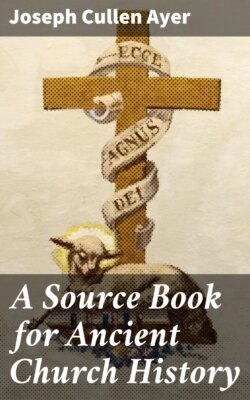Читать книгу A Source Book for Ancient Church History - Joseph Cullen Ayer - Страница 162
На сайте Литреса книга снята с продажи.
(b) Lampridius, Vita Alexandri Severi, 29, 43, 49. Preuschen, Analecta, I, § 13.
Оглавление[pg 153]
Alexander Severus (222–235) succeeded his cousin Heliogabalus. The mother of Alexander, Julia Mammæa, sister of Julia Soæmias, mother of Heliogabalus, was a granddaughter of Julius Bassianus, whose daughter, Julia Domna, had married Septimius Severus. It was through marriages with the female descendants of Julius, who was priest of the Sun-god at Emesa, that the members of the dynasty of Severus were connected and their attitude toward religion determined. It was in the reign of Alexander that syncretism favorable to Christianity was at its height.
Ch. 29. This was his manner of life: as soon as there was opportunity—that is, if he had not spent the night with his wife—he performed his devotions in the early morning hours in his lararium, in which he had statues of the divine princes and also a select number of the best men and the more holy spirits, among whom he had Apollonius of Tyana, and as a writer of his times says, Christ, Abraham, and Orpheus, and others similar, as well as statues of his ancestors.
Ch. 43. He wished to erect a temple to Christ and to number Him among the gods. Hadrian, also, is said to have thought of doing this, and commanded temples without any images to be erected in all cities, and therefore these temples, because they have no image of the Divinity, are to-day called Hadriani, which he is said to have prepared for this end. But Alexander was prevented from doing this by those who, consulting the auspices, learned that if ever this were done all would be Christians, and the other temples would have to be deserted.
Ch. 49. When the Christians took possession of a piece of land which belonged to the public domain and in opposition to them the guild of cooks claimed that it belonged to them, he decreed that it was better that in that place God should be worshipped in some fashion rather than that it be given to the cooks.
